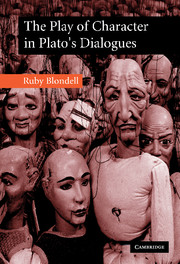Book contents
- Frontmatter
- Contents
- Preface
- 1 Drama and dialogue
- 2 The imitation of character
- 3 The elenctic Sokrates at work: Hippias Minor
- 4 A changing cast of characters: Republic
- 5 Reproducing Sokrates: Theaetetus
- 6 Putting Sokrates in his place: Sophist and Statesman
- Bibliography
- General index
- Index of passages cited
3 - The elenctic Sokrates at work: Hippias Minor
Published online by Cambridge University Press: 22 September 2009
- Frontmatter
- Contents
- Preface
- 1 Drama and dialogue
- 2 The imitation of character
- 3 The elenctic Sokrates at work: Hippias Minor
- 4 A changing cast of characters: Republic
- 5 Reproducing Sokrates: Theaetetus
- 6 Putting Sokrates in his place: Sophist and Statesman
- Bibliography
- General index
- Index of passages cited
Summary
The Platonic corpus includes a series of striking portraits of Sokrates at work using a method commonly referred to as “the elenchus.” “Elenchus” (testing, interrogation, refutation) is only one of the words used by Plato for Sokrates' activities, and its use as a technical term has become contested. But it is not necessary to commit oneself to a specific or technical account of his methods in order to identify the elenctic Sokrates, with reasonable clarity, as the figure of the Apology, who tests those reputed to be wise, affirms his own ignorance, and reaches few, if any, positive results. Whatever term we choose to describe his use of question and answer, it functions as “a gadfly-sting designed to instill aporia in his interlocutors, to stir up the appetite for philosophy, and to show the audience (including the readers) that those who pretend to wisdom … are not really wise.”
Plato's techniques for characterization are particularly important in his representations of this figure at work, not just because of Sokrates' own peculiarities but because of the ad hominem nature of his approach, which makes the dramatic delineation of his interlocutors especially significant. This Sokrates examines not just arguments but individual people, in ways that cast doubt not merely on their beliefs, but on the personality, way of life, and social roles that condition those beliefs and are in turn conditioned by them. His method is therefore intrinsically ad hominem in a peculiarly personal way.
- Type
- Chapter
- Information
- The Play of Character in Plato's Dialogues , pp. 113 - 164Publisher: Cambridge University PressPrint publication year: 2002



